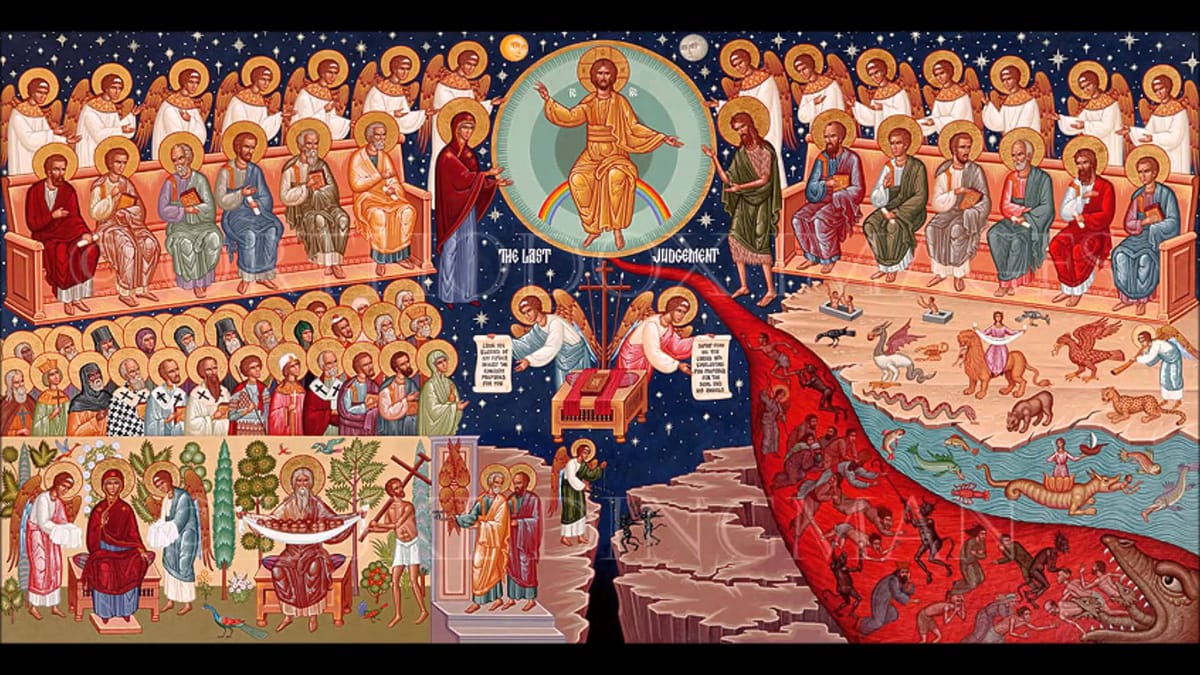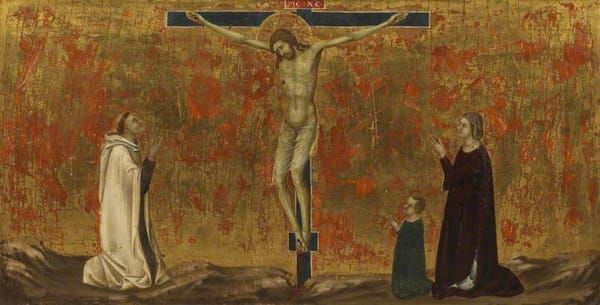On the Uses and Abuses of "Realized Eschatology"
Insofar as we persist in using the word eschatology, it cannot by definition, for us here and now, ever be fully "realized."

Some weeks ago, one of my parish priests here in Jacksonville, FL (we'll call him Father M) delivered a thought-provoking homily on Mark 13:24-32. Sometimes called Mark's Olivet Discourse, Jesus here prophecies apocalypse.
"But in those days, after that tribulation, the sun will be darkened, and the moon will not give its light, and the stars will be falling from heaven, and the powers in the heavens will be shaken. And then they will see the Son of man coming in clouds with great power and glory. And then he will send out the angels, and gather his elect from the four winds, from the ends of the earth to the ends of heaven.
"From the fig tree learn its lesson: as soon as its branch becomes tender and puts forth its leaves, you know that summer is near. So also, when you see these things taking place, you know that he is near, at the very gates. Truly, I say to you, this generation will not pass away before all these things take place. Heaven and earth will pass away, but my words will not pass away.
"But of that day or that hour no one knows, not even the angels in heaven, nor the Son, but only the Father. Take heed, watch; for you do not know when the time will come."
It's a tough passage for several reasons, chief among them that most any examination of the "evidence" would suggest that, no, "these things" did not take place before "this generation" passed away – at least, not in the mode we modern readers (and probably, I think, even the disciples themselves, given their thick-headedness in response to much of Jesus' teaching) could be reasonably expected to have envisioned them. I, for one, am confident that, here in my present moment (December 2024), heaven and earth persist. I imagine the disciples were convinced of the same, too, as they lay on their deathbeds (or, more likely, awaited their execution for, in part, preaching this imminent apocalypse) decades later. Were they disappointed, perhaps?
Certain early Gnostic texts even allude to this very frustration – that is, the disciples' imagined angst at the prospect of "those who would be born" (a slight against the notion of imminent eschaton) as I wrote about here. Those texts are almost certainly not historically accurate, but the idea that the earliest Christians might be upset or, at least, somewhat surprised about the fact of future generations coming into existence was clearly something these books' authors expected readers to readily understand, and something that should makes sense to us in light of, especially, the Apostle Paul's intense eschatological musings. Here's Paul in I Corinthians (emphasis mine):
"I think that in view of the impending distress it is well for a person to remain as he is. Are you bound to a wife? Do not seek to be free. Are you free from a wife? Do not seek marriage. But if you marry, you do not sin, and if a girl marries she does not sin. Yet those who marry will have worldly troubles, and I would spare you that. I mean, brethren, the appointed time has grown very short; from now on, let those who have wives live as though they had none, and those who mourn as though they were not mourning, and those who rejoice as though they were not rejoicing, and those who buy as though they had no goods, and those who deal with the world as though they had no dealings with it. For the form of this world is passing away."
But in this homily on the Olivet Discourse, Father M suggested that we might interpret this of Jesus' "end times" discourses not as a failed prophecy, but as something else – a vision that intimates Jesus' own imminent death. Indeed, we're told just a few paragraphs later that, during the afternoon of Jesus' crucifixion, "there was darkness over the whole land." Matthew's and Luke's gospels relate the same exact detail. Further, if we take Paul's Christology seriously in Colossians 1 (especially verses 16-17), what we might, can, and maybe should consider "all things" ended that very afternoon, for "all things were created through him and for him ... and in him all things hold together."
And beyond an apologia for the idea that this of Jesus' prophecies was fulfilled just days later during his execution, Father M raised the question of whether we might also better understand something about our own lives in this light of a "realized eschatology" (he didn't use that term in the homily, but I think the characterization is useful). The end comes for everyone, after all. And insofar as each of us is the image of God, a vast something indeed ends when we die and are allegedly whisked before some "unveiling" (apokálypsis) of God. In a homily just a few weeks prior, this same priest suggested that we might, as an exercise, consider the human being to be the universe's fundamental "unit of analysis" – a proposition from which we might reasonably suggest that one man's end is, itself, an event worthy of calling an "apocalypse."
St. Gregory of Nyssa, in particular, spoke of man with eminently lofty language, which, I think, implies something very profound about man's ultimate end:
Man was introduced last among beings ... so that, by making of his own division [into male and female] a beginning of unity which gathers up all things to God their Author, and proceeding by order and rank through the mean terms, he might reach the limit of sublime ascent that comes about through the union of all things in God, in whom there is no division.
I'm not a St. Gregory scholar, but I think he has in mind here that it is available for all men to play some part in this "sublime ascent," and to thereby bring some piece of our shared apocalypse into view. Joseph Ratzinger hints at this same idea in Introduction to Christianity via "Christology's apparent positivism" and clear allusions to a personalist theology wherein every individual shares in the destiny of Jesus' personhood.
The world is in motion toward unity in the person. The whole draws its meaning from the individual, not the other way about. To appreciate this is also to justify once again Christology's apparent positivism, the conviction – a scandal to men of all periods – that makes one individual the center of history and the whole. The intrinsic necessity of this "positivism" is thus demonstrated anew: if it is true that at the end stands the triumph of spirit, that is, the triumph of truth, freedom, and love, then it is not just some force or other that finally ends up victorious; what stands a the end of is a countenance. The omega of the world a "you", a person, an individual.
(And actually, Father M insinuated this personalism in another previous homily, wherein he suggest we consider select parts of the St. Ignatius Prayer "in reverse as we received communion" – that is, as Jesus speaking to us: – Take ... receive all my liberty, my memory, my understanding, my whole will, all that I have and all that I possess. ... Give me your love ... for with this I have all that I need.)
Now, in correspondence with Father M following that Sunday, he wisely suggested to me that it's possible to "push the limits" with regard to a "fully-realized eschatology." A thoroughly (even if not merely) historical (or in-time) "second coming" is, and has always been, integral to any Christian notion of apocalypse. Weaseling entirely out of that dogma with vague allusions to personal death or the historical death of Jesus is probably hardly more than an exercise in sophistry.
Eliade
That particular rejoinder reminds me of something I read a few months ago and wrote about here – a passage from Mircea Eliade's invaluable The Sacred and the Profane, and, more importantly, a significant exception he makes to it.
First, the passage itself:
"[R]eligious man lives in two kinds of time, of which the more important, sacred time, appears under the paradoxical aspect of a circular time, reversible and recoverable, a sort of eternal mythical present that is periodically reintegrated by means of rites. This attitude in regard to time suffices to distinguish religious from nonreligious man; the former refuses to live solely in what, in modern terms, is called the historical present; he attempts to regain a sacred time that, from one point of view, can be homologized to eternity."
There is, of course, language to this effect in the Catechism (paragraph 1085) as it teaches on Christ's work in the Liturgy saying "The Paschal mystery of Christ ... cannot remain only in the past ... and all that Christ is ... participating in the divine eternity, and so transcends all times while being made present in them all."
But as I noted, it's not so much this quote that's relevant here, but Eliade's exception noted a few paragraphs later, wherein he (rightly) suggests that Christianity is not sufficiently understood in this way alone because Christianity has a referent both in mythical and historical time. Jesus had a birth and death date, and walked this earth in the historical past. Eliade writes (emphasis mine):
Christianity goes even further in valorizing historical time. Since God was incarnated, that is, since he took on a historically conditioned human existence, history acquires the possibility of being sanctified. The illud tempus evoked by the Gospels is a clearly defined historical time – the time in which Pontius Pilate was Governor Judea – but it was sanctified by the presence of Christ. ... For the Christian, too, the sacred calendar indefinitely rehearses the same events of the existence of Christ – but these events took place in history; they are no longer facts that happened at the origin of time, "in the beginning."
In light of this, and of what Father M said, I wonder whether we might think about the eschaton in the same way. I've already illustrated the both collective and subjective nature of apokálypsis. In turn, just as Eliade says a religious person commemorates and relives the past with rites (which, for Catholics, happens most prominently during the Eucharist), maybe we also should think and do likewise with the future, or the eschaton. Per the Apostle's Creed, after all, he will come – not has come. The eschaton is both mythical ("realized") and historical. It is happening and will yet come to pass in "empirical" time – a both-and analogous to how, in the liturgy, the Paschal mystery "transcends all times while being made present in them all."
And at the least, insofar as we persist in using the word eschatology, it cannot by definition, for us here and now, ever be fully realized.
I don't suppose I've offered anything particularly original here. And I've likely made this too complicated. But I still think this is worth saying, at the least to remind us, as Father M suggested in this same homily, to not seek the fulfillment of all things in the eschaton solely through the fleeting and often hollow machinations of empirical history or "current events." The fact is, some of what Jesus called "these things" have already come to pass in particular way, and those ways are relevant to us right now, and may even be brought to bear more fully every day within and because of us. And then, on the other hand, we shouldn't become so closed in on ourselves that we expect to find a fully "realizable" eschaton within, to the detriment of our ability to see the eager anticipation of God's revelation and His justice in the eyes, especially, of those who suffer around us today – flesh-and-blood human beings for whom earthly justice has been elusive and, at best, only a very-distant hope.





